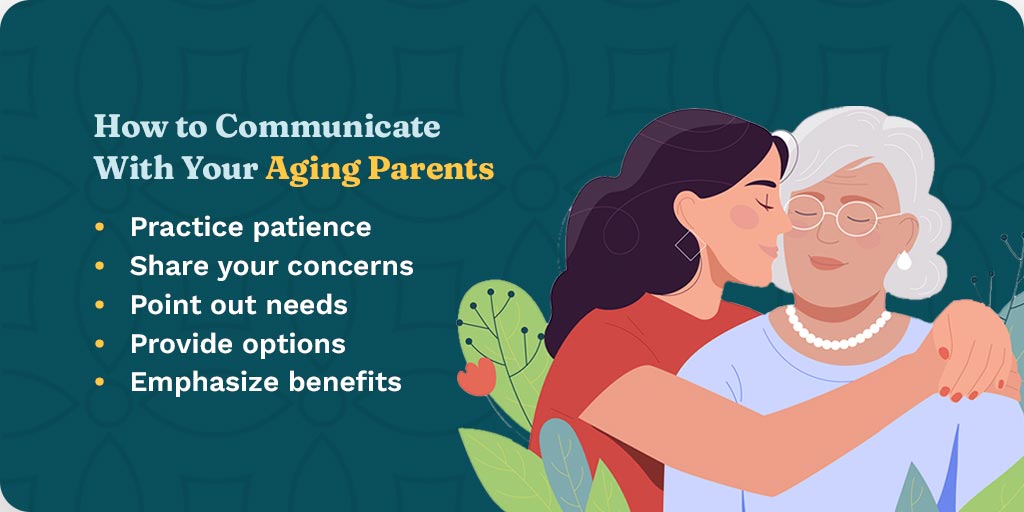What to Do When Your Loved One Won’t Accept Care & Assistance

Founder & CEO

Are you struggling to persuade an aging parent to consider additional support? You aren’t alone. This struggle is more common than you might think. Many adult children don’t know what to do when their parents refuse help at home.
While many older adults resist care, those who accept and receive care prefer home and community-based care over long term care communities such as assisted living facilities and nursing homes.
In this guide, you’ll learn why your parent might be refusing care and what to do when they won’t listen to your reasoning. We will also share practical communication tips for having these types of conversations and managing the stresses associated with caring for an elderly parent.
Common Reasons Older Adults and Elderly Parents Refuse Help
There are many reasons your parent might refuse help, including the loss of independence, anxiety about impending changes or fear of change of what once was. For this reason, it’s best to speak with your parent one-on-one to better understand their concerns.
Common reasons for resistance to care or in-home help include:
- Loss of Independence: Change is difficult, especially for those who believe they might lose part of their independence.
- Loss of control: The household decision maker is no longer in the driver seat – a parent who was once the head of the household or who made all family decisions may dread this loss of control.
- Shame, embarrassment or fear: Your parent might feel ashamed, embarrassed or fearful of recent changes in their cognitive or physical state.
- Failure to recognize changes: Your parent might not recognize — or wish to ignore — their changing or diminished physical and mental capabilities.
What to Do When Your Elderly Parents Won’t Listen to You
If your parent continues to decline the suggestion of home care services, start with the following strategies.
Have an Open-Minded Discussion With Your Parent
It’s challenging to step back and listen to a parent who refuses care when the writing is on the wall. After all, they’re your parents. You want the best for them. While it’s tempting to believe you hold all the answers, your elderly parent has the right to refuse home care if they’re independent and able to make their own decisions.
First, take a step back to collect your thoughts and emotions. When you’re ready, sit down and have an open-minded discussion with your parent. During your conversation, ask them what their honest thoughts, concerns and fears are about accepting help, and be sure to listen thoroughly before you respond.
Remember — always speak in an uplifting manner and avoid pressuring them or using condescending tones.
Assess Your Parent’s Current Home Situation
Evaluate your parent’s current living conditions, day-to-day activities and physical and mental health. Identify what tasks your parent can’t complete independently to pinpoint where they need assistance. For example, your parent might need help with the laundry if their laundry room is located up or down a flight of steps.
Ask your parent to be a part of this process. Being involved is vital for their sense of control. However, they might not wish to be fully honest with you out of shame or embarrassment, so be sure to address this. State frankly but politely what you have seen them struggle with and what services you believe might benefit them.
Get a Second Opinion From a Trusted Individual
Your parents might struggle to take your concerns seriously. To them, it doesn’t feel like that long ago that you were the one that relied on them. They are used to being the caregiver in your relationship. However, your roles are slowly reversing — so fear or stubbornness might cloud their judgment.
To combat this, ask a trusted third party to sit in on a discussion with you and your parent. This person should be someone your elderly parent trusts and admires, like a spiritual guide, or a professional, like a care manager. A second opinion about the benefits of home care services aired by a trusted authority or seasoned professional might reach them in ways you — as their child — could not.

How to Communicate With Your Aging Parents
Here are some practical ways to communicate with your aging parents and present different home care options tactfully:
- Practice patience: It’s paramount you are patient with your aging parent. Always consider their perspective. Take deep breaths before responding, and be intentional with your reactions.
- Share your concerns: Share your concerns with your parent, especially if you or an elderly spouse is their primary caregiver. Explain the potential consequences of relying on an aging spouse or how challenging it is to keep up with their care. Doing so ensures they understand your perspective, too.
- Point out needs: The next time you notice your parent’s housework has fallen behind, they are wearing soiled clothes or they’re feeling lonely, bring up the topic of home care. Suggest they consider selecting a few critical tasks they might need help with.
- Provide options: Whenever you discuss home care, make sure your parent understands what it is. Discuss the different services available to them. Let them know they can choose the kind of in-home help they receive and how often.
- Emphasize benefits: Explain the benefits of home care that your parent might not have considered before. They will preserve energy, meet new people, have more time and energy for activities they enjoy and remain independent longer.
Tips for Dealing With the Stresses of Caring for an Aging Parent
It’s emotionally taxing caring for an aging parent who refuses help. You might even be struggling with guilt or doubting the idea of home care altogether due to their adverse reaction. However, it’s okay to suggest your parent seek help — if only to give you or their primary caregiver some much-needed respite.
Keep the following tips in mind when dealing with the stresses of caring for an aging parent:
- Be kind to yourself: You might accidentally say something hurtful or become emotional during a tough conversation. Forgive yourself, ask for forgiveness and try to approach the subject again after the dust has settled.
- Accept the situation: Your parent has the right to refuse in-home help. Try to accept the situation for what it is for your peace of mind. Know you’ve done everything possible to get your parent the help they need. Enlist the help of friends or family members to provide care in the interim.
- Seek guidance or counseling: If you’re taking on the responsibility of caring for an elderly parent alone, seek support from a trusted individual or professional counselor. Without respite and support, your emotional needs become neglected, making caring for your parent even more challenging.

Contact Corewood Care Today for Senior Home Care Services
When your parent is ready to consider home care services, turn to Corewood Care. Our friendly team of reliable caregivers specializes in round-the-clock senior home care support services.
We proactively prevent and mitigate risks at home so your parent can thrive and live independently. We’ll provide you and your parent the guidance, tools and options to make the best, most informed care decisions possible.
Contact us today to schedule your free assessment and determine whether our caregivers are the right fit for your loved one.



